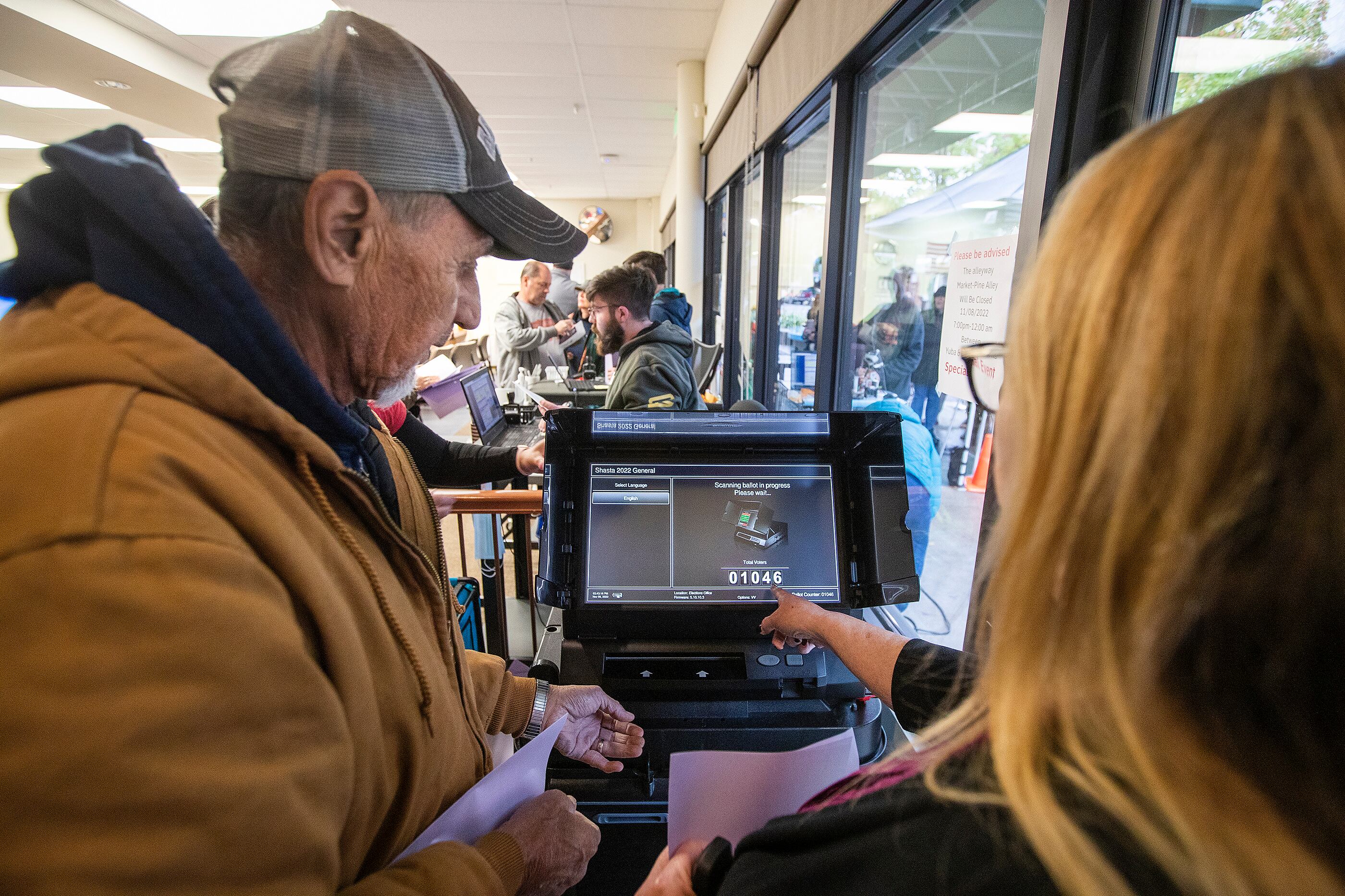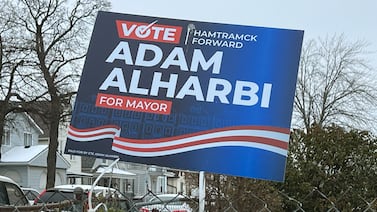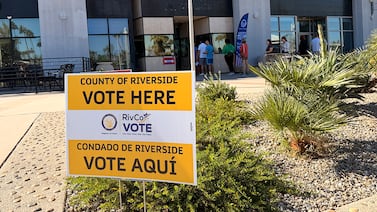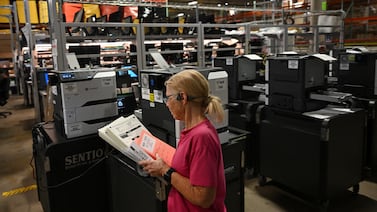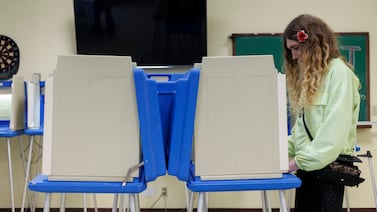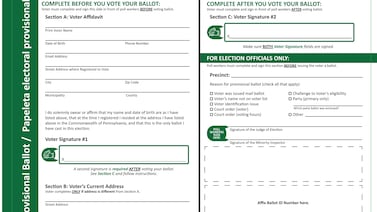Votebeat is a nonprofit news organization reporting on voting access and election administration across the U.S. Sign up for our free newsletters here. A version of this post was originally distributed in Votebeat’s free weekly newsletter. Sign up to get it delivered to your inbox every Saturday.
Our Arizona reporter, Jen Fifield, and I were at the National Association of State Election Directors conference this week in Charleston, South Carolina. I ate oysters. Jen did not. We both, however, learned a lot.
Among the more pressing issues discussed this week was the update to the Voluntary Voting Systems Guidelines. I know! Thrilling stuff! I can see your eyes closing as I write this but please look closely at your screens at the acronym “VVSG 2.0.” Because it is important, and it is welcome, and, like many things in elections, has already been subject to a torrent of rumors and inaccurate information. Election officials across three states told me they’d already been getting calls and emails about this, and I’m sure there are more (you, perhaps? Email me.)
These guidelines were originally adopted in 2005, mildly updated in 2015, and the second round of full updates passed in late 2021 after years of work and delay. As you can imagine for technology standards passed that long ago, a lot of the changes are straightforward acknowledgements of better technology. Others update expectations for how disabled voters should be able to interact with the machines, or establish standards for who can connect to the machines and how.
It seems that recent coverage of the new standard’s imminent arrival — before the 2024 election but also way before any machines certified to that standard will be ready — has caused some deep misunderstandings in the far-right blogosphere and the accompanying social media platforms. As they see it, apparently, the machines not certified to this new standard (read: all of the ones currently in use) will suddenly be decertified and therefore, compromised. That’s false.
These are a system of voluntary guidelines that most states choose to follow, essentially as minimum standards for voting machines. The current ones are already deeply out of date. Their update is long overdue, and welcome by every election administrator I’ve spoken to. But the update does not mean that any machine certified to the older standards becomes suddenly decertified or less reliable than it is now.
Most of the machines currently in use are certified to the so-called VVSG 1.0 standard, which was introduced in 2005. In 2015 , the U.S. Election Assistance Commission introduced the VVSG 1.1 — which not a single machine in use was ever certified to. Did you feel a massive change when 1.1 happened, or in the years since? Did your voting machine suddenly go black, and your elections suddenly become unsupported or compromised? No. That won’t happen now, either. Existing machines stay just as they are now, and new machines rolling off the line have to be certified to a slightly higher standard.
But that’s not the story far-right blogs are telling:
“All of the machines are officially compromised, and they’re not even trying to hide it at this point,” wrote one. This is absolutely false.
When, for example, Honda produces a new model of Civic that comports with new laws on driving safety — for example, making rearview cameras standard — older cars without this technology don’t suddenly become undriveable. They are just as safe as they were the day before – new machines are just a little bit safer. You may still drive your car, and the Honda dealership will still service it. You can continue taking it in for inspections, and it will continue to pass them if it is in good working order.
Forcing everyone to buy a new car as soon as a more updated model is available would be impossibly expensive, and it would also chill the ability to issue updates so that the sector can improve. The same is true here.
“Certainly, we want to see people move to 2.0, but they also have to be realistic about the constraints,” said Amy Cohen, the director of NASED, at the recent conference. “There is a well-documented process for systems to be decertified, and that’s not what is happening here.”
Machine decertification has happened. California decertified machines in 2007, and other states – which have standards that exceed these voluntary guidelines – have chosen not to certify systems available and used in other states. But rest assured, nothing about the introduction of VVSG 2.0 means that the existing 1.0 systems are less effective than they are now.
Votebeat reporters are covering the push to hand-count ballots and we want to hear about your experiences. What is the conversation around hand counting like in your community? What arguments are you hearing from hand-counting advocates? Reply to this email to let us know.
Back Then
Elections have consequences, folks! And in 1932, that consequence was a bunch of people getting arrested for drunken behavior. See this coverage from the Tampa Bay Times, shortly after Franklin D. Roosevelt was elected and folks thought that temperance was immediately over.
“It looks to me as if a lot of people celebrated the election of Roosevelt,” Mrs. Ida M. Fisk, president of the Pinellas County chapter of the Woman’s Christian Temperance Union, wrote to the local paper. She noted — after scanning police reports — that 62 people had been arrested for drunkenness in November while only 34 had in October.
“Excitement over the election,” asserted then-Police Chief R.H. Noel, led to the increased drinking as voters celebrated.
New From Votebeat
From Votebeat Arizona: Maricopa County says it had no way to know its ballot printers would fail. Printer maker says the risk was clear.
From Votebeat Pennsylvania: How Pa. counties spent the first-ever election grants from the state — and why they want more
In Other Voting News
- Former New York City Mayor and Trump lawyer Rudy Giuliani has acknowledged making false statements when he said two Fulton County election workers mishandled ballots during the 2020 election. Giuliani made his admission as part of a defamation lawsuit filed against him by the two workers, Ruby Freeman and Shaye Moss, and acknowledged his statements were “actionable” and “false,” but said he believed they were protected under the First Amendment, the New York Times reported.
- States passed twice as many laws expanding voting access this year as restricted it, according to a new analysis by FiveThirtyEight using data from the Voting Rights Lab, with nearly all the restrictive laws enacted in states controlled by Republicans.
- Election officials are worried threats and misinformation will make it even harder to recruit already scarce poll workers for the 2024 election, prompting states including Oklahoma and Alabama to pass pay raises and others pursue new partnerships to help with recruiting, USA Today reported. At least some counties in Ohio are still searching for poll workers for an Aug. 8 special election.
- The U.S. Cybersecurity and Infrastructure Security Agency (CISA) will hire 10 additional election security specialists across the country to boost protection of election infrastructure in advance of the 2024 presidential election, Jen Easterly, the head of CISA, announced at the National Association of State Election Directors conference in Charleston, South Carolina.
- NPR previews an upcoming redistricting trial ahead over local commissioners court maps in Galveston County, Texas.
- Mississippi cannot enforce a law setting criminal penalties for some people who assist others with absentee voting during upcoming elections, a federal judge ruled this week, finding the statute violates the Voting Rights Act, the Associated Press reported.
Jessica Huseman is Votebeat’s editorial director and is based in Dallas. Contact Jessica at jhuseman@votebeat.org.

